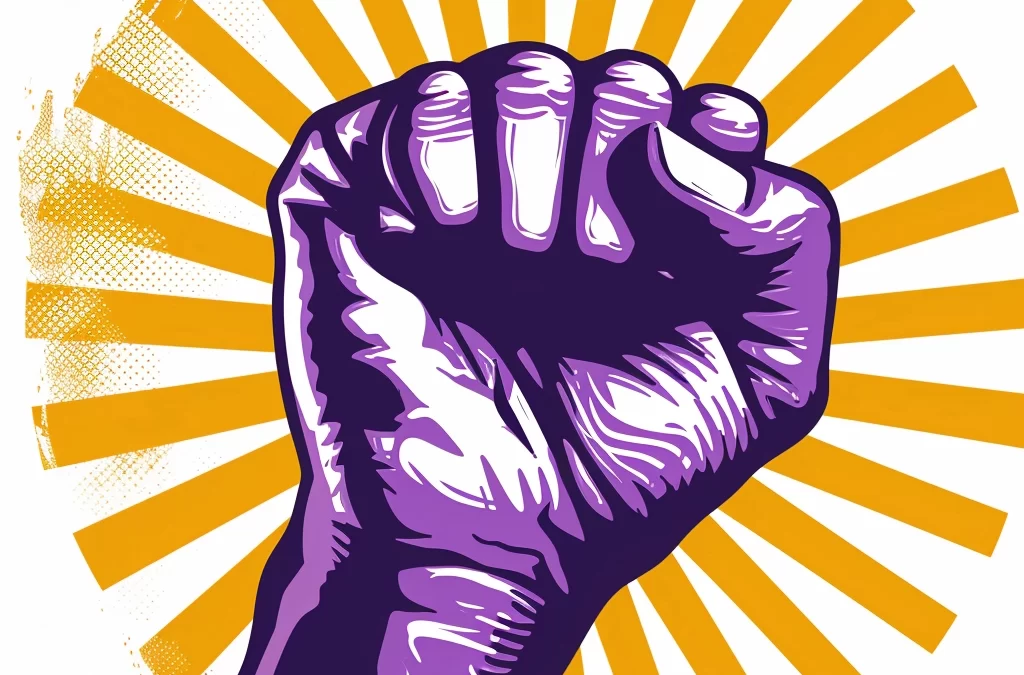When Tracie Kimbrough came to the Lancaster EDD office as a steward, she made it clear that worker’s rights must be enforced in the office. She ordered copies of the contract for everyone, highlighting critical sections of the contract that her fellow EDD workers needed to know, including when medical substantiation for sick leave could be requested, and startup and shutdown time at the workplace. There had not been a steward presence in the office for several years, and many members were unaware of their rights.
When Tracie Kimbrough came to the Lancaster EDD office as a steward, she made it clear that worker’s rights must be enforced in the office. She ordered copies of the contract for everyone, highlighting critical sections of the contract that her fellow EDD workers needed to know, including when medical substantiation for sick leave could be requested, and startup and shutdown time at the workplace. There had not been a steward presence in the office for several years, and many members were unaware of their rights.
When managemen sent employees home for wearing union gear—behavior protected by the Dills Act—Tracie received a panicked call and responded to the situation.
“I sent a cease and desist to management, contacted members and got statements on what happened while it was fresh in their mind,” said Kimbrough, “and then immediately contacted the URC to alert them to an unfair labor practice.”
Rosemary Valencia, a worker at EDD Workplace Services, exercised her protected right to wear her union shirt at her workplace. A first-level manager asked her to cover it up. When she refused, the manager sent her home to change, saying her shirt was not professional.
“It was Purple Up Wednesday, so I wore my shirt. I talked with my coworker who had been told that it was not professional, and a manager talked to him. My manager that day was teleworking, but my coworker’s manager told me to take the shirt off.
However, managers were already discussing how to prevent workers from wearing their shirts.
“All of a sudden, I get a call from my manager,” said Valencia. “She said she’d heard that I was wearing a shirt that was offensive. I said it’s Union Wednesday, and that I’m wearing the shirt I’d gotten at my meeting.”
She was upset at the clear violation of her rights, but management pressured and bullied her to go home and change.
“I knew it wasn’t a problem to wear my shirt, but I asked if I needed union representation,” said Valencia. “I didn’t like where it was going. I know my rights and that I can wear my shirt in the workplace. She’s not even here, but I felt like I was bullied and had to leave before my break.”
This was not an isolated incident. At the same workplace, another coworker, Gary Newnham was told by a second-level manager that the solidarity fist could be considered a gang sign.
We were unable to come to a resolution, so Tracie proceeded with filing the charges and encouraged our members in spite of the length of the process.
“We have to stay the course,” Kimbrough said. “If we allow management to violate our rights in a small way, it’ll be a very short amount of time before they’re violating them in a big way.”
After filing the charges and keeping affected employees updated, the EDD workers stayed positive and took action. Every Wednesday, all members who had passed probation purpled up in the workplace.
“I’m so proud of my office for standing strong against management,” said Kimbrough, “Even when they continued to pressure workers while we were going through our ULP process.”
Our win at PERB confirms our rights in the workplace. There is no credibility in management’s claims that our union attire is out of dress code. They found that none of the workers should have been sent home, and that the PERB decision should be posted in the workplaces or read in its entirety to all members in the office.
“What management was doing was wrong, and violated our protected rights,” said Kimbrough. “The real heroes are our members, Rosemary Valencia and Gary Newnham, who stood up for their rights in the workplace and had the guts to follow through in the process.”
“If they keep doing this,” Valencia said, “we’re prepared to continue the fight. We have to stand up for what’s right.”
Enforcing our hard-earned contract rights is a Local 1000 priority. If you feel your rights have been violated, contact your workplace job steward, or call the Member Resource Center at 866.471.SEIU (7348).
